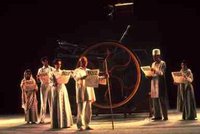This realization sort of snuck up on me, but I have to say I think David Gockley's
first fully planned season is the most exciting one the San Francisco Opera has offered in a quarter of a century. The claim to fame isn't the rep list itself — it's slightly chestnut-laden, and although I love me some Civil War, the prospect of Philip Glass's
Appomattox doesn't set the pulse racing like
Saint François d'Assise or
Le Grand Macabre, to say nothing of
Doctor Atomic.
But what this season has going for it, unprecedentedly in my experience with the company, is that it's entirely filler-free. Every single production promises some reason to get excited — the first visit by intriguing directors like Robert Lepage and Mary Zimmerman, starry debuts by Natalie Dessay, Ewa Podles and Angela Gheorghiu, a huge list of debuts by singers I never heard of, or, what the hell, even just Maurice Sendak's
Magic Flute production, coming here for the first time.
The only thing on the schedule that leaves me cold is the opening-night
Samson and Delilah, and that's a function of my own idiosyncrasies: I have no particular use for any 19th-century French music that isn't by Berlioz (remember, "Gounod" is an anagram of "ungood"), and although I'm an Olga Borodina fan, I'm not, you know, the
world's biggest Olga Borodina fan. If you're a little more normal than I am on either of those two points, then even that one should get you going.
What's lacking from this season is the
Bohème or
Traviata revival trotted out in a familiar old production, with singers we all love but have heard a bunch of times before and an amiable time-beater in the pit. And that's not something you can say about any prior season that I can recall. If Gockley's tenure turns out to be as successful as I hope, it'll be due in part to this kind of conscientious consistency. He just doesn't seem to do throwaways.
P.S. To clarify, and forestall some needless whining: I don't care what the calendar says, as soon as Debussy picked up his pen the 19th century was over.





